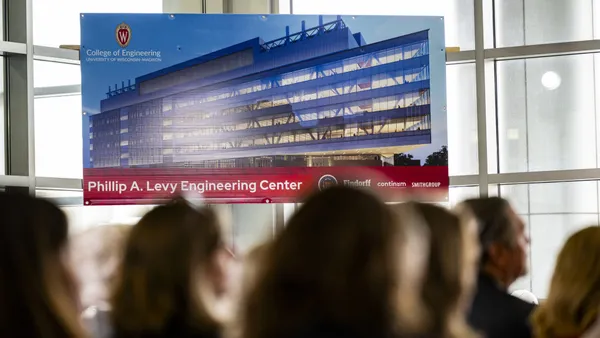Dive Brief:
- Sweden-based construction firm Skanska reported Wednesday that first-quarter profit dropped roughly 21% year over year to $151 million (1.5 billion Swedish Krona), or about 18 cents a share.
- Although the global contractor and developer doesn’t have projects in Ukraine, the Russian incursion there poses continued uncertainty for what was an already stressed supply chain, CEO Anders Danielsson said, while also slightly hindering the contractor’s book-to-build ratio in Europe.
- Danielsson said the effects of the COVID-19 pandemic appear to be subsiding in many regions where Skanska does business, leading to a return to higher bookings and increased backlog.
Dive Insight:
Skanska, currently working on U.S. projects such as office tower 1550 on the Green in Houston (pictured above), ended the quarter with about $1.3 billion in U.S. construction order bookings, up from $970 million a year ago, a book-to-build ratio of 120% and 21 months of backlog in the U.S.
On a global basis, the contractor’s operating income fell to $188 million, a 23% drop after adjusting for currency effects and inflation, which still beat analysts’ forecasts. Despite those income drops, the operating income for its construction business grew nearly 5% from a year ago to $77 million.
After an earnings call with analysts on Wednesday, Skanska CFO Magnus Persson told Construction Dive that the company continues to deal with inflation, which it has seen across sectors and regions since the start of the COVID-19 pandemic.
"It looks a little bit different across different markets, but this all started a year and a half or two years back on the back of the pandemic, essentially with the supply chain disturbances that were created by that,” Persson said. “And we're still living in the aftermath of that. It hasn't gone away at all.”
When it comes to the war in Ukraine, Skanska hasn’t seen the impact on its supply chain as much in the first quarter. One reason for that, Persson said, is that the pandemic trained the company on how to cope with supply chain threats over the last couple years.
Managing predictability
The best way to manage those challenges, Persson said, is to manage expectations as much as possible, spending more time with project owners. To help combat the labor shortage, Persson said Skanska tries to ensure that predictability with union partnerships.
“We think that unions are ... a good counterpart to work with because you can sort of trust the agreements that you have with unions across our different markets,” Persson said. “So that makes cost development predictable for us. It's the predictability here that is important for us.”
Skanska is among the first of global commercial builders to report earnings for the quarter. Jacobs Engineering Group posted an increase in profits and backlog this week, while Granite reported a 20% quarterly revenue loss.
Looking ahead, Persson told Construction Dive that he is optimistic for the entire U.S. construction industry, predicting that a year from now, strong demand for infrastructure work will lead to more development.
"I think [infrastructure funding] will be a favorable development on the market,” Persson told Construction Dive. “Not at least thanks to the support money that is … starting to reach states and so on. And hopefully they will be employed in a swift and value-creating manner both for the citizens and for the contractors."














